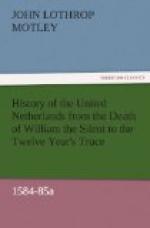Title: History of the United Netherlands, 1584-85
Author: John Lothrop Motley
Release Date: January, 2004 [EBook #4838] [Yes, we are more than one year ahead of schedule] [This file was first posted on April 2, 2002]
Edition: 10
Language: English
Character set encoding: ASCII
*** Start of the project gutenberg EBOOK history of united Netherlands, 1584-85 ***
This eBook was produced by David Widger widger@cecomet.net
[Note: There is a short list of bookmarks, or pointers, at the end of the file for those who may wish to sample the author’s ideas before making an entire meal of them. D.W.]
HISTORY OF THE UNITED NETHERLANDS From the Death of William the Silent to the Twelve Year’s Truce—1609
By John Lothrop Motley
MOTLEY’S HISTORY OF THE NETHERLANDS, Project Gutenberg Edition, Volume 38
History of The United Netherlands, 1584-1585
CHAPTER III.
Policy of England—Schemes of the Pretender of Portugal—Hesitation of the French Court—Secret Wishes of France—Contradictory Views as to the Opinions of Netherlanders—Their Love for England and Elizabeth—Prominent Statesmen of the Provinces—Roger Williams the Welshman Views of Walsingham, Burghley, and the Queen—An Embassy to Holland decided upon—Davison at the Hague—Cautious and Secret Measures of Burghley—Consequent Dissatisfaction of Walsingham— English and Dutch Suspicion of France—Increasing Affection of Holland for England.
The policy of England towards the Provinces had been somewhat hesitating, but it had not been disloyal. It was almost inevitable that there should be timidity in the councils of Elizabeth, when so grave a question as that of confronting the vast power of Spain was forcing itself day by day more distinctly upon the consideration of herself and her statesmen. It was very clear, now that Orange was dead, that some new and decided step would be taken. Elizabeth was in favour of combined action by the French and English governments, in behalf of the Netherlands—a joint protectorate of the Provinces, until such time as adequate concessions on the religious question could be obtained from Spain. She was unwilling to plunge into the peril and expense of a war with the strongest power in the world. She disliked the necessity under which she should be placed of making repeated applications to her parliament, and of thus fostering the political importance of the Commons; she was reluctant to encourage rebellious subjects in another land, however just the cause of their revolt. She felt herself vulnerable in Ireland and on the Scottish border. Nevertheless, the Spanish power was becoming so preponderant, that if the Netherlands were conquered, she could never feel a moment’s security within her own territory. If the Provinces were annexed to France, on the other hand, she could not contemplate with complacency the increased power thus placed in the hands of the treacherous and jesuitical house of Valois.




